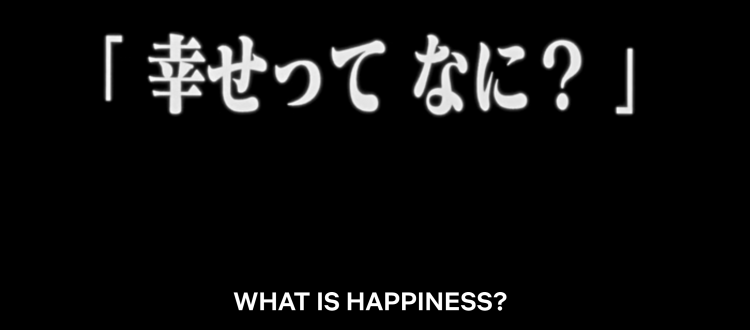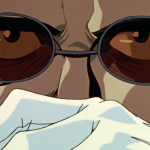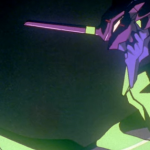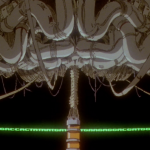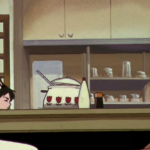Revangelion: Part 25 – The Cruel Ending World
Here we are, almost at the end – the end of a series that has gone off the rails and ceased to give a damn about telling a story. And the end of a review project that I started as a different version of myself. At this point, all Evangelion wants of the audience is pity. All I want is to be freed of this mecha albatross.
Even as Evangelion comes to a close, we are still expected to see ourselves and our own frailties in the faces of the characters. That’s not what I signed up for. Group therapy by character proxy was not the call to action in episode 1. And unlike Shinji Ikari, I’m too damn well adjusted to fall for this gimmick.
That doesn’t mean I’m not crazy, mind you. No sane person would write this much about Evangelion. It simply means that I’m too comparatively sane to buy into what Hideki Anno is selling. Indeed, this is me saying no to Neon Genesis Evangelion. As a critic, I have become “the beast.” I will hold this series to my standards. I am not going to indulge in a sliding scale that gives credence to an author’s abject arrogance in presuming to do nothing but lazily foist his baggage on the audience before giving himself a round of applause for the effort.
I will not scream or cry. Ice flows through my veins. I will gleefully squeeze my robot’s fingers around this concept without giving it a second thought. I am not your Shinji, nor should any audience have to be.
Against all reason and common sense, the penultimate episode of Evangelion introduces a new character to the series. I don’t know this character’s name or their relationship to the series. There’s no sense of identity to them. They are, at once, a fourth wall violation and something that is an active agent within the story. Perhaps it is the voice of the author engaging in a direct conversation with the characters while also diving into a self-reflective dialectic. This character presents as a series of snap cuts to title cards that undermine everything that the main characters are saying. I’m going to call this character Cut-to-title-card, as to underscore how creatively bankrupt Evangelion has become in its final moments.
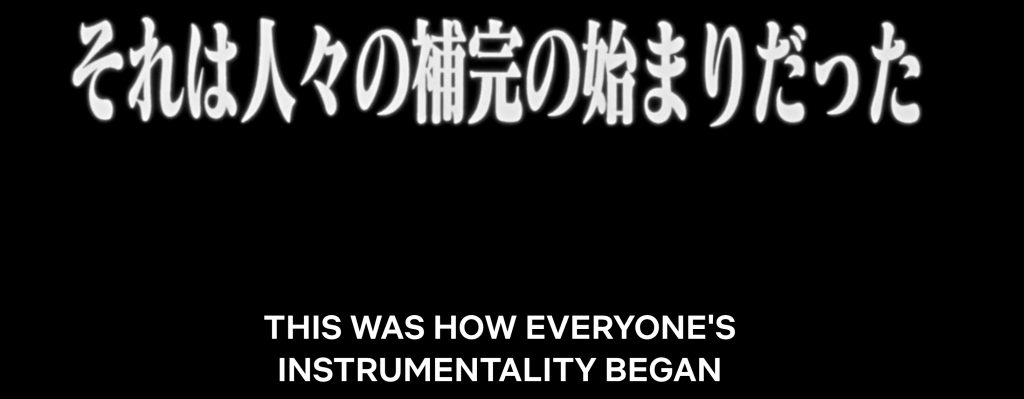
Cut-to-title-card first tells the audience that the Human Instrumentality Project has started, and that we are all becoming one. We are informed that the Project is filling in the holes in the human heart until we all revert to nothingness. Behold, the super-smoothest of all narrative transitions from the end of the last episode to this episode.
Cut-to-title-card then becomes a voice of character interrogation. For example, Misato’s opening phase of instrumentality is to say she was happy with Kaji. Cut-to-title-card asks, “Were you really happy?” Misato says yes. Cut-to-title-card asks, “Were you really happy?” Misato says yes. Cut-to-title-card then asks, “What is happiness?” It goes on like this.
THIS ENTIRE EPISODE is the characters reflecting on themselves with Cut-to-title-card existing to undermine everything that is said on a textual level. Then Gendo shows up to “well, actually” Cut-to-title-card on how Instrumentality is a return to humanity’s individual state. That is to say, humanity as a collective individual rather than humanity as a collection of individuals.
Fantastic. Thanks, Gendo. Who knew a story needed two narrators?
That being the case, though, what the hell is the point of Cut-to-title-card? Why are they a thing if Gendo is going to show up and double explain things to us? Is…is Cut-to-title-card god? Is this the end point of Hideki Anno’s dogma? The long arc of Evangelion is a return to an undergraduate film class? Am I really supposed to have a self-serious conversation on if something as genuinely bizarre as a story arguing with its own characters is manifestation of god?
Fine. Fuck it. Let’s roll with that idea. I could get behind the idea of Cut-to-title-card as god if this particular aspect of the divine did anything that we hadn’t already seen a half dozen times. There is supposed to be capital-T truth in the divine. Cut-to-title-card offers nothing more than a retread of the traumas, neuroses, and psychoses that have informed Shinji, Rei, Misato, and Asuka since their very introduction on to the screen. This lack of insight is also why Cut-to-title-card is a pants-on-head stupid representation of each character’s inner psyche. The inner self is just as obvious as the one presented to the audience.
Shinji does not understand his purpose in life. As such, he is insular and nihilistic. He struggles to define himself on his own terms, and in doing so he seeks out people who would tell him who he is supposed to be.
Asuka does not understand how to be vulnerable without presenting as weak. Consequently, she compartmentalizes her traumas and creates a façade of herself who must be the best at everything.
Rei does not understand her humanity because she’s not a real human. She subsequently questions if she has a soul, and if the things she has done in life have any actual meaning beyond playing out Gendo’s schemes.
None of these ideas are new at this point in the series. This ground is so well worn that the municipality has laid down paved roads and rezoned the surrounding lands as mixed-use residential.
The writing wants us to believe there isn’t space in the screenplay to show how Instrumentality happened beyond saying the last angel is dead. Nor will Anno make time to loop back to the most meaningful question between Ritsuko and Misato: what gives Ritsuko and Gendo the right to force Instrumentality on people without their consent? There is, however, ample time to bang on about known traumas before pivoting hard to slut shaming Misato.
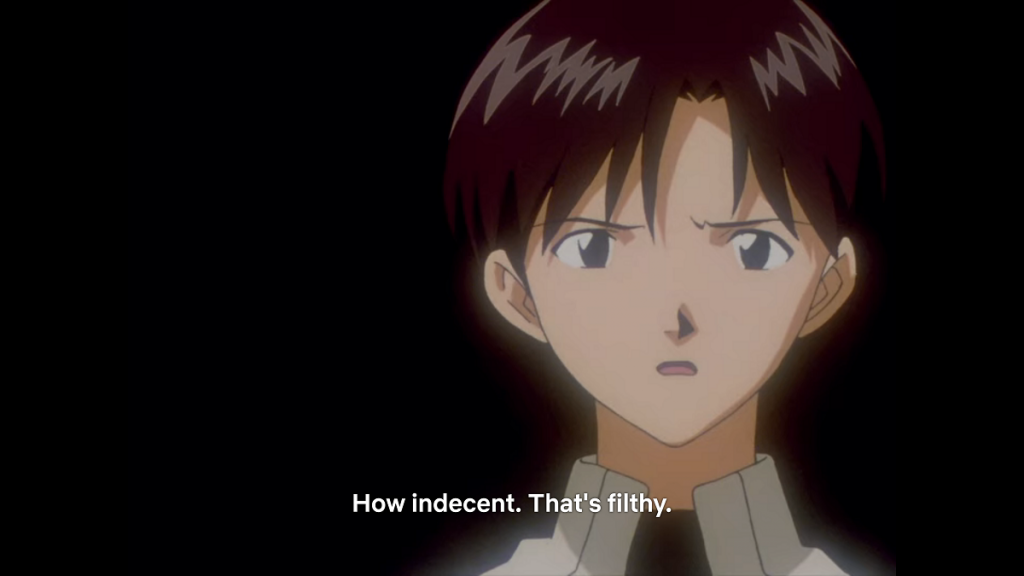
Did you really think we were going to get through this without a return to form on weird sex stuff?
Amid exploring Shinji’s malaise – again – there is a lengthy divergence into why Misato is the way she is – all of which is, likewise, known to the audience. Much of this content is dedicated to Misato’s issues with her father and wanting to be “dirty”. The metaphors that drive what it means to be “dirty” are not subtle. During Misato’s self/cross examination, the scene cuts to Shinji staring into a fan with an angry look on his face. The sonic background to this look of stern disapproval is the rumble of a train locomotive paired with a baseball batter socking a dinger to the universal approval of a crowd.
GET IT? BASEBALL. SEX. HOMERUN.
SPORTS AS STAND-IN FOR SEXUAL ACHIEVEMENT.
ALSO, TRAINS ARE LONG AND HARD. TUNNELS ARE…HOLES. TRAINS GO IN HOLES.
DO YOU GET IT? SHOULD I MAKE SOME HAND GESTURES TO HELP YOU UNDERSTAND?

IT IS IMPORTANT TO HIDEKI ANNO THAT YOU GET THAT YOU GET IT.
See, it’s not fun when people shout things at you. And if you rightly roll your eyes at me for such a juvenile exaggeration, then there is no way to give Evangelion a pass for doing the same thing. Particularly when it seems that the only “dirt” on Misato is having *checks notes* two relationships with the same guy. Sure, those relationships tugged some Freudian baggage in their wake, but if we take Misato at her final word, then she did love Kaji for himself and not because of how he might have reminded her of her father.
This is where the experiment of having characters arguing with themselves, each other, or (sigh) god, on the nature of their realities hits its most alienating point. If, in the final moments of the story, we come to accept that everything we thought we believed about these characters is a lie, then what was the point of the story? Creating doubt about character intentions and motivations can drive conflict in the middle of the story, but that’s not what one typically does at the end.
This fundamentally bizarre path leads to the only interesting mote within the episode. Following all the slut shaming and childhood traumas, the episode reveals that Shinji has somehow withdrawn from Instrumentality. The metaphor is a that of a playhouse (because of course). Seated alone in the audience, the characters in Shinji’s life explain he is in a space of his own making. It is a place where he is totally alone, absolutely safe, and wholly insulated from pain. The hook for Shinji is that this stage can become whatever he wants it to be. A life free from pain means a life where he creates the rules of his existence. The proposed cost is that in eternal isolation he will lose the ability to define himself – because reasons.
It’s an interesting end-point for the episode in consideration of Misato asking how people consent to Instrumentality. At no point in the episode did the writing ever get around to answering that fundamental question. It was left open-ended until this final scene; wherein, consent to Instrumentality must be retroactively manufactured – at least for Shinji. It is not clear from the frantic and shifting narration if this is happening for everybody else. That would, you know, be interesting. One might see this ending as less arrogant and alienating if episode 25 and 26 existed in a liminal space where the world rejects Instrumentality, one person at a time.
Shinji’s choice, such as it is, presents two paths: consent to Instrumentality after the fact and join the gestalt, or stay in the theatre and be forever isolated from blissing out in the perpetual panopticon of Instrumentality. A place where, apparently, your shame doesn’t matter because you can see everybody else’s shame, and we’re all going to forgive each other.
Honestly, there is so much to be said about the kind of juvenile mind that thinks this particular modus vivendi would bring about anything but a brand new degree of human misery. Imagine what Twitter would be like if we all knew each other’s secrets. You think it’s is a hell site now? Imagine how bad it gets when we know each other’s browser history.
Who wants to live in a world where a dude can swagger up to a woman and say, “so I hear you’re into some weird shit. I’m Kenny. This is my buddy Daryl.” Both men appear before the woman naked, because there are no trousers in paradise. That’s what Instrumentality would be like if you stop and think about it for more than eight and a half seconds. If humans are scum as individuals, a notion frequently espoused in Hideki Anno’s writing, then how is magically linking a bunch of garbage people into a hive mind going to produce a being of pure bliss and belonging? Sounds more like the recipe for a Cronenberg monster.
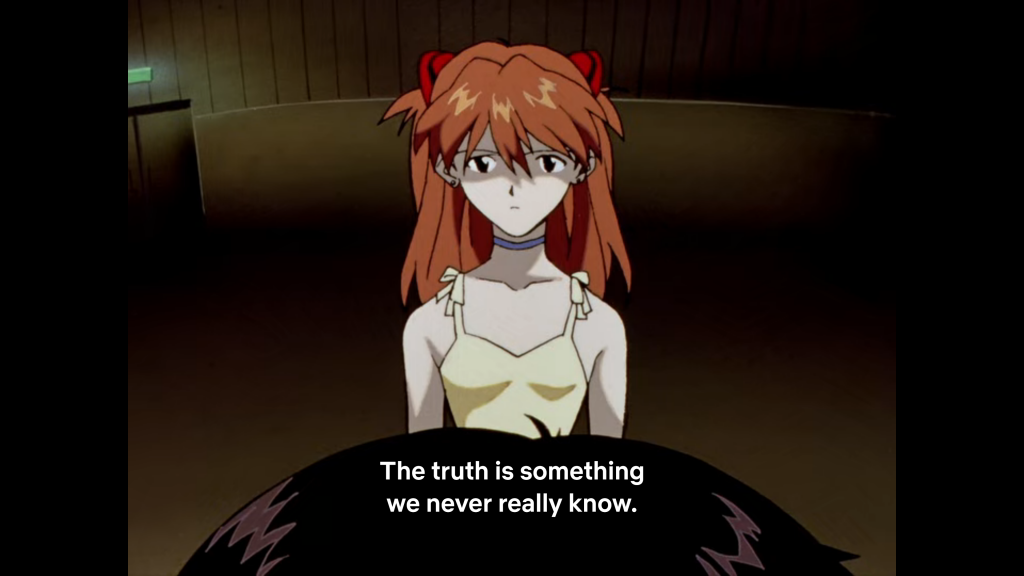
From where I sit, Shinji’s choice not much of a choice. I’ll take the perpetual and eternal holodeck catering to my every whim over a universe of knowing what all my friends and co-workers actually think of me. The notion that such knowledge would bring about wholeness is just childish utopianism.
All that said, this episode must serve as a final proof that Gendo Ikari is a Bond villain. Though if Gendo is Blofeld, then SEELE must be SPECTRE, since they also wanted to trigger Instrumentality. The actual core of the conflict between Gendo and SEELE seems to be like so many religious schisms: less about the dogma and more about tribal details, which in retrospect don’t really seem all that evident to the average passer-by.
So now Shinji has a choice, join the collective or spend life alone. The series finally proposes to answer the problem identified in episode 3-ish as the porcupine’s dilemma: how can Shinji (standing in for people, writ large) get close to other people when closeness results in mutually assured pain. Clearly, Hideki Anno didn’t actually do much research on hedgehogs and happiness.
Twenty five episodes and that’s the long arc. Great. Majestic. Roll on the next episode.

